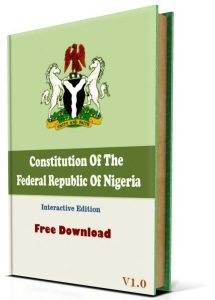Nigeria Moves Closer to Stripping Top Officials of Legal Immunity

Nigeria’s Historic Legislative Move
ABUJA – Nigeria’s House of Representatives took a historic step Wednesday toward dismantling one of the most controversial protections for political leaders. They advanced legislation that would expose the nation’s vice presidents, state governors, and their deputies to criminal prosecution while in office. The constitutional amendment bill passed its crucial second reading amid heated debates about accountability and political stability in Africa’s most populous democracy.
Lawmakers voted overwhelmingly to advance the measure that would modify Section 308 of Nigeria’s 1999 Constitution. This section currently shields presidents, vice presidents, governors, and deputy governors from civil and criminal proceedings during their tenure. The proposed changes would maintain immunity only for sitting presidents and vice presidents when acting as president. This marks the most significant potential shift in executive accountability since Nigeria’s return to democratic rule in 1999.

Driving Forces Behind the Bill
Primary sponsor Solomon Bob (PDP-Rivers) argued during floor debate that the existing framework enables corruption. “In Nigeria, we permit unnecessary protections for officials who don’t need them,” he stated. “A vice president who never ascends to the presidency enjoys four years of legal invincibility. State governors operate as emperors, knowing courts can’t touch them.” The legislation forms part of 81 constitutional amendments currently moving through parliament. These include proposals to create five new states and redefine traditional rulers’ roles.
Supporters point to high-profile corruption cases that stalled against state executives, including the ongoing $2.1 billion arms deal scandal involving a former national security adviser and multiple governors. Anti-corruption campaigners celebrated the development, with Transparency International Nigeria calling it “a potential game-changer” in their decade-long push for accountability reforms.
Opposition and Concerns in Nigeria
State governments mounted fierce opposition ahead of the vote. Ogun State Attorney General Oluwaseun Ogungbade warned of “politically motivated lawsuits paralyzing state administrations.” He cited Nigeria’s history of weaponized corruption charges. Twelve state assemblies passed resolutions condemning the measure as federal overreach. Kano State lawmakers argued it would “create permanent campaign seasons through endless litigation.”
Safeguards and Challenges
The proposed amendment includes safeguards against frivolous cases. It requires prosecutors to demonstrate that alleged crimes fall outside an official’s constitutional duties. President Bola Tinubu’s administration remains officially neutral, though sources close to the presidency confirm behind-the-scenes efforts to broker compromises on implementation timelines.
Legal experts note practical challenges despite the legislative progress. “State judiciary systems already struggle with basic caseloads,” said University of Lagos constitutional law professor Nkem Okoro. “Without massive investments in court infrastructure and security for judges handling politicians’ cases, this reform could collapse under its own weight.”

Parallel Reforms and Future Steps
Parallel reforms gaining momentum include measures to separate the attorney general’s prosecutorial powers from justice ministry oversight. Requirements for automatic publication of Nigeria government audit reports are also advancing. Lawmakers also moved forward on bills creating Etiti State in the southeast and Ijebu State in the southwest. This continues Nigeria’s tradition of using state creation to manage ethnic tensions.
As the bill moves to committee stage, attention shifts to state assemblies that must ratify any constitutional changes. With 27 of 36 state legislatures controlled by opposition parties, observers predict tough negotiations. Senate President Godswill Akpabio urged calm Thursday, stating: “This is not about targeting individuals but strengthening institutions. We will ensure proper safeguards before final passage.”
The immunity debate resurfaces painful memories of Nigeria’s anti-corruption struggles. Former EFCC chairman Nuhu Ribadu welcomed the move but cautioned: “Laws alone won’t cure corruption. We need political will to prosecute big cases and protect whistleblowers.” As Africa’s largest economy grapples with mounting economic challenges, citizens increasingly view accountability reforms as crucial for restoring public trust and attracting foreign investment.
Final implementation could take 12-18 months if approved, coinciding with preparations for the 2027 general elections. For now, the legislation stands as the most concrete threat to Nigeria’s culture of executive impunity since the 1999 democratic constitution took effect. As debate continues, all eyes remain on whether this anti-corruption measure will survive Nigeria’s complex political realities – or become another well-intentioned reform derailed by systemic challenges.

